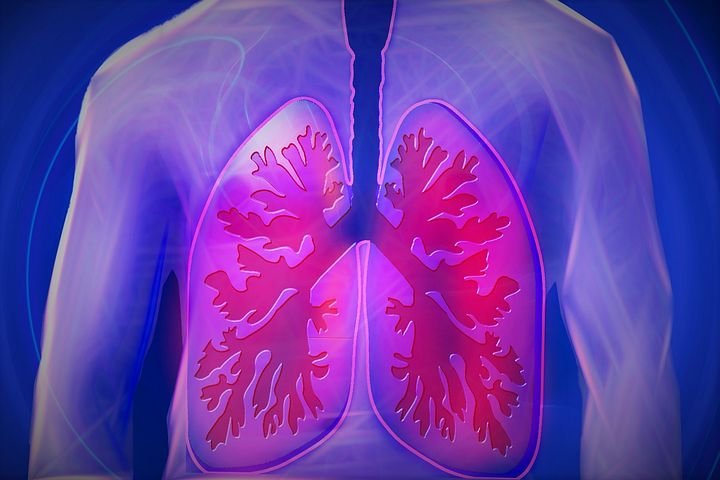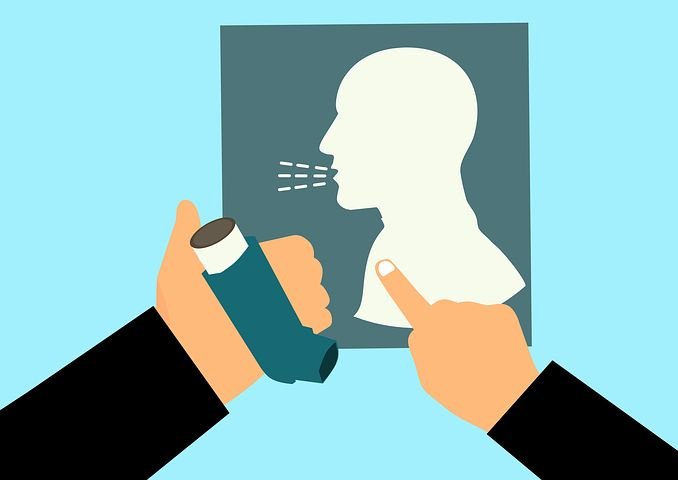
Pixabay CC0
Asthma is a distressing condition which usually comes on periodically, and is more likely to occur at certain times of the year. During severe attacks, the patient has great difficulty in breathing. Asthma is an allergic condition, an abnormal response of the body to some substances such as pollen, mould, animal fur, various chemicals, fumes, odours, as well as certain foods or drugs. Certain germs in the nose and throat may also cause asthmatic attacks. These attacks are more frequent when the patient is tired or under severe emotional strain. Even changes in the weather may sometimes bring on an attack.
During a severe attack, some of the smaller windpipes become plugged with thick, sticky mucus. The patient can breathe in easier than he can breathe out. This is what causes wheezing. As a result, the air sacs become greatly distended and some of their walls may rupture. In a very severe attack, there may also be some bleeding into the air sacs of the lungs.
Asthma may develop gradually during an attack of bronchitis or it may begin suddenly the moment a person is exposed to some offending substance. Most attacks begin suddenly. The patient first feels a sense of tightness in the chest. This tightness may subside in an hour or two, or it may continue for hours or even days at a time. At the end of the attack, the patient may suddenly cough up the thick mucus and the air passages are cleared.
Family History:
In many cases, there is a family history of allergy, the parents or other members having hay fever, giant hives, asthma, or some other allergic condition. It is always advisable to have an X-ray of the chest to rule out any other serious condition, such as a tumor in the lung or an aortic aneurysm.
Asthma beginning in infancy is usually due to foods. If it comes on during late childhood and early adult years, it is most likely due to pollen, dust, or chemicals. After 45 years of age, asthma is more often due to an infection.

Pixabay CC0
Treatment:
If a definite cause for the asthma can be found, it should by all means be eliminated if possible. Infections of the nose, throat and tonsils should be given appropriate treatment. During a severe attack of asthma, Epinephrine or adrenaline-in-oil can be given to relieve the severe wheezing. Epinephrine can also be used in a nebulizer. Aminophylline is also useful and can be given by vein, but only under the direction of a physician. Ephedrine, 25 or 30mg tablets may be given every four hours during a severe attack, but some suitable sedative should also be given to reduce anxiety and irritability in the heart. Isoprenaline is of real value to many patients.
In severe prolonged attacks of asthma, oxygen may also be necessary. A positive pressure machine, if available, might be tried, but this should be done only under the direction of a physician. The more severe asthmatic cases are best treated in hospital. Prednisolone and other steroid preparations are sometimes valuable, particularly during severe intractable asthma. However, these hormone preparations, although effective, must be used with caution and only in more severe cases.
Antibiotic medicines, such as penicillin, are of value in treating infections which may bring on an attack of asthma in people who are prone to this condition.
It is important for the patient to build up his general health. He should choose a balanced diet, and avoid emotional stress and unnecessary fatigue. Asthmatic patients should not smoke, nor should they come in contact with other irritants such as chemicals, paints, or dust. Asthma itself is rarely fatal unless some serious heart condition is also present. However, the anxiety and fear of suffocating will only aggravate an attack.
Asthma patients must keep calm, for excitement only increases the difficulty in breathing. Aerosol inhalations are often of value between attacks, particularly in those who are frequently troubled with asthma.
Asthma patients should avoid colds and undue exposure. Some children outgrow asthma, but all asthma patients, whether children or adults, should be under the care of a qualified physician.
Fortunately, or should I say, unfortunately, I have witnessed first hand an asthma attack, and the victim was a bit careless with the Ventolin inhaler. It was a scary minute as I frantically searched the house to locate it. I discovered it lodged under the wardrobe, within seconds of handing it to the sufferer and the rapid inhalation that followed suit, there was an instant relief which you could guess calmed my frayed nerves :)
Asthma is a scary condition and ironically, the first approach to treating it is not being scared, i.e, keeping calm until it subsides. I was Asthmatic as a child so I understand perfectly what it feels like to be one. I had to quit sports especially football because of my condition then. I'm so glad to be one of the few to outgrow it.
Cheers @greenrun. Happy new year!
Never knew someone could outgrow it. How did some outgrow it and others like my uncle never did?
Only a few outgrow it. It's actually a matter of mastering your triggers and staying away from them long enough that they don't bother you anymore.
Well, that makes sense. Thank you for sharing.
You're welcome!
Hello! I find your post valuable for the wafrica community! Thanks for the great post! We encourage and support quality contents and projects from the West African region.
Do you have a suggestion, concern or want to appear as a guest author on WAfrica, join our discord server and discuss with a member of our curation team.
Don't forget to join us every Sunday by 20:30GMT for our Sunday WAFRO party on our discord channel. Thank you.